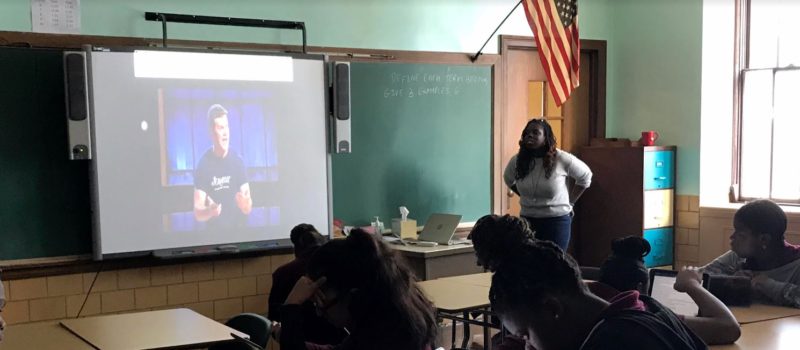“In case you hadn’t realized,
it has somehow become uncool
to sound like you know what you’re talking about?”
So begins “Totally like whatever, you know?”, a poem by former high school English teacher and internationally renowned spoken word poet, Taylor Mali. The poem, as performed by Mali on the Def Poetry Jam, uses words, tone, inflection and bodily gestures to satirize the lack of conviction and certainty with which many people, particularly young people, tend to speak – with filler words such as “like,” “whatever,” “totally,” “cool,” and higher inflection at the ends of sentences to indicate a constant question that never resolves into a declarative statement – “Invisible question marks and parenthetical (you know?)’s” – Mali embodies the phenomenon he describes.
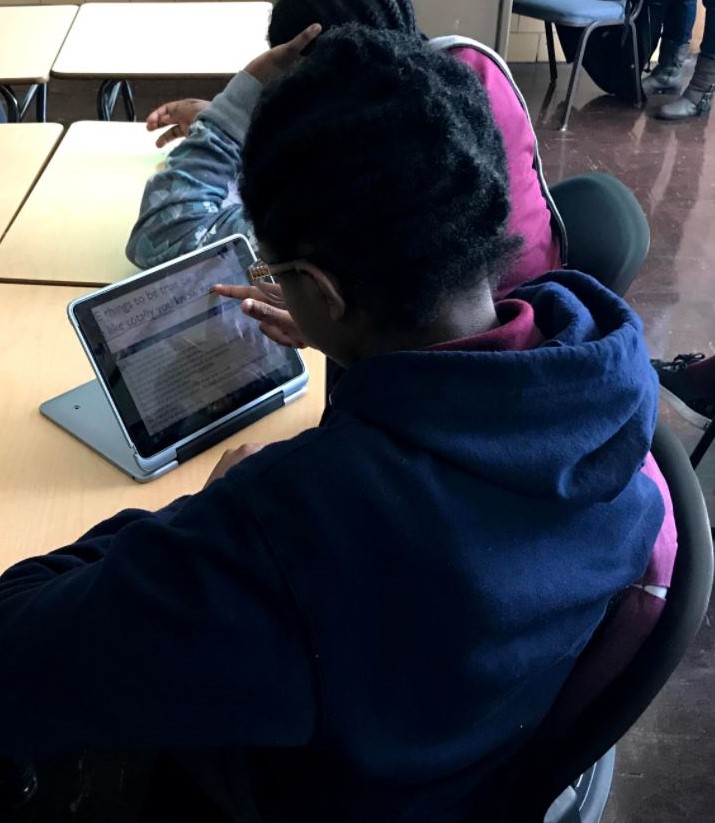
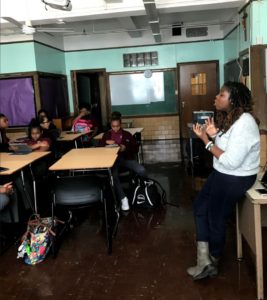 Once a week in Ms. Daniel’s and Ms. Brown’s English classes, Simone Waugh (Ms. Simone) from Generation Verb comes in to lead a spoken word poetry workshop in which students learn the many elements of the craft, and perform compositions of their own. On the day when they watched Mali’s performance, students began by first reading an unpunctuated version of the poem on their iPads, knowing nothing yet about the poet – not his race, gender, or any aspects of his biography – or the bodily and vocal gestures he would use in the performance. Their first task was to take some guesses about how the poem would sound when performed, who its speaker would be, how the syntax would flow, etcetera.
Once a week in Ms. Daniel’s and Ms. Brown’s English classes, Simone Waugh (Ms. Simone) from Generation Verb comes in to lead a spoken word poetry workshop in which students learn the many elements of the craft, and perform compositions of their own. On the day when they watched Mali’s performance, students began by first reading an unpunctuated version of the poem on their iPads, knowing nothing yet about the poet – not his race, gender, or any aspects of his biography – or the bodily and vocal gestures he would use in the performance. Their first task was to take some guesses about how the poem would sound when performed, who its speaker would be, how the syntax would flow, etcetera.
Next, they watched the performance, while listening for punctuation pauses and marking them on their versions. The second time through, they listened for changes in inflection – the pitch of a speaker’s voice rising and falling – and marked words and phrases where they heard such changes. After reviewing a fully punctuated version of the poem and making comparisons to their own markings, they watched the performance again, this time observing aspects of body language including posture, facial expressions, mimicry, and the other ways Mali used his limbs to shape pieces of the poem on the stage.
Watch Taylor Mali perform “Totally like whatever, you know?
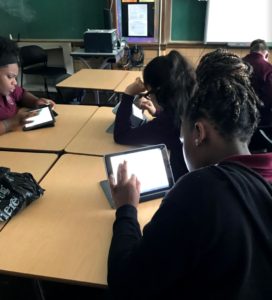 Students were surprised to hear how humorous the poem is when performed – when reading, they initially heard it as angry and critical, while when the poem took flesh through the performance, they started to hear the layers of satire and the drama the poem unfolds between fragile, questioning uncertainty and clear, precise, convicted declaration. In addition, each time they watched the poem again with a different aspect of the performance in mind, they discovered the many different facets of the craft. Ms. Simone explained that in spoken word, language becomes deeply embedded in all the different parts of bodily communication – rather than becoming abstracted from the body, as many students tend to expect from poetry. In fact, she told the students that in this art form, language can become a form of dance.
Students were surprised to hear how humorous the poem is when performed – when reading, they initially heard it as angry and critical, while when the poem took flesh through the performance, they started to hear the layers of satire and the drama the poem unfolds between fragile, questioning uncertainty and clear, precise, convicted declaration. In addition, each time they watched the poem again with a different aspect of the performance in mind, they discovered the many different facets of the craft. Ms. Simone explained that in spoken word, language becomes deeply embedded in all the different parts of bodily communication – rather than becoming abstracted from the body, as many students tend to expect from poetry. In fact, she told the students that in this art form, language can become a form of dance.
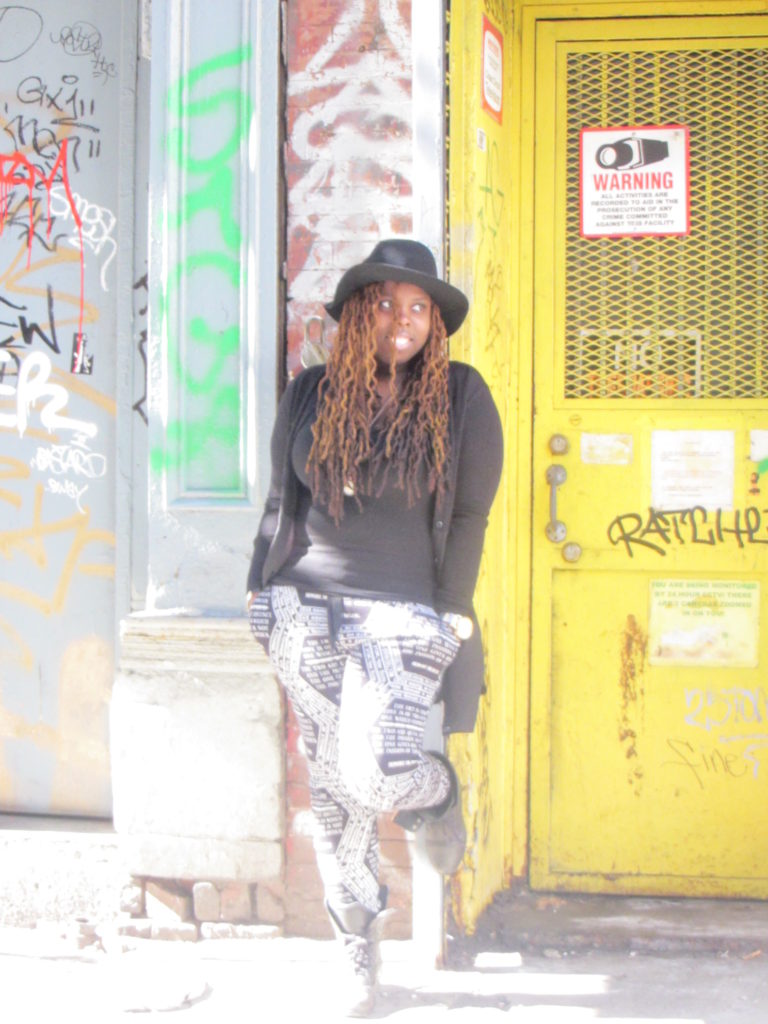 Ms. Simone is a writer and creative consultant who loves working with teens and young adults. She has taught everything in schools martial arts to dance and theatre/drama. “Teaching poetry, especially to a group of young women, has been fulfilling in every way,” she says. “I enjoy watching their confidence grow as writers and performers. As a poet, this gives me the opportunity to work on my craft as well.” This is Waugh’s first year as a member of Generation Verb, an organization that facilitates the teaching and learning of the traditional African art of storytelling, from which spoken word derives, in schools and other educational settings. The organization and its founder, poet Kraal Charles, hope that through learning this history and craft of spoken word, students will discover their own voices, and gather skills and confidence to tell their stories.
Ms. Simone is a writer and creative consultant who loves working with teens and young adults. She has taught everything in schools martial arts to dance and theatre/drama. “Teaching poetry, especially to a group of young women, has been fulfilling in every way,” she says. “I enjoy watching their confidence grow as writers and performers. As a poet, this gives me the opportunity to work on my craft as well.” This is Waugh’s first year as a member of Generation Verb, an organization that facilitates the teaching and learning of the traditional African art of storytelling, from which spoken word derives, in schools and other educational settings. The organization and its founder, poet Kraal Charles, hope that through learning this history and craft of spoken word, students will discover their own voices, and gather skills and confidence to tell their stories.
Are you interested in performing arts, culture, and literature at SJHS? Click here for more stories!
Read an interview with Simone Waugh about her experience as a filmmaker here.

